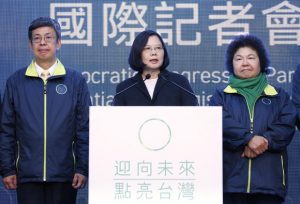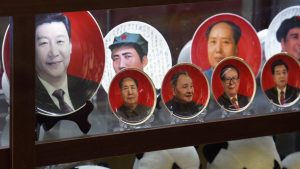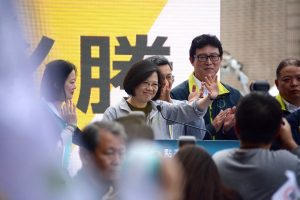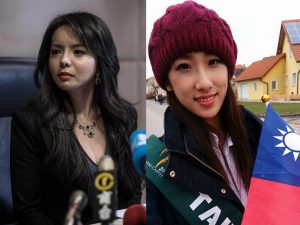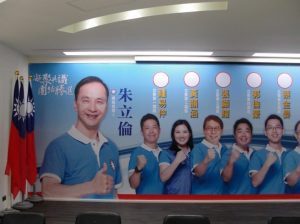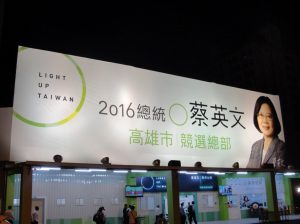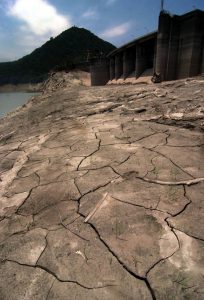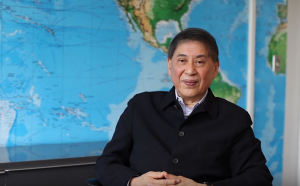Taiwanese Public Support For the Trans-Pacific Partnership: A Deal Breaker?
Memo #377 By: Timothy S. Rich – timothy.rich[at]wku.edu and Lucas Knight – lucas.knight078[at]topper.wku.edu Twelve countries comprising nearly 40 percent of the global economy signed onto the Trans-Pacific Partnership (TPP) in February. Taiwan’s president-elect Tsai Ing-wen of the Democratic Progressive Party (DPP) has indicated her support for joining, yet persuading the Taiwanese public may take additional work. […]
Xi Jinping as Chiang Kai-shek 2.0
Memo #363 By Jeffrey Wasserstrom – jwassers [at] uci.edu Which past leader of a one-party state is Xi Jinping most like? When he took power in 2012, some expected his rule to resemble that of Hu Jintao, his predecessor – a bland technocrat uninterested in shaking things up. Others suggested he might morph into a […]
Taiwan’s 2016 elections: An exercise in generational change
Memo #359 By J. Michael Cole – jmichaelcoleintaipei [at] gmail.com More than ever before in Taiwan’s history, political contention is not defined by ethnicity. A clash of generations, rather, is shaping the positioning of the two leading parties in the 2016 elections. The opposition Democratic Progressive Party (DPP) has understood, and then embraced, this shift […]
Pageantry Politics: Beauty Queens Challenging the Chinese Government
Memo #358 By Jonathan Brasnett – jonathan.brasnett [at] alumni.ubc.ca While beauty contests have often been analyzed as sites of gendered oppression or commodification, they have actually long been sites of political contestation and to a lesser degree, activism by the contestants. In November 2015, when the People’s Republic of China faced two beauty queens raising controversial […]
Preparing for Taiwan’s Future? KMT’s Keys for Reducing the Margin of Defeat
Memo #354 By: Justin Kwan – justin.kwan [at] alumni.ubc.ca In one of Taiwan’s latest opinion polls, Kuomintang (KMT) Presidential Candidate Eric Chu is projected to only have 20% of national support, a distant second place for a party that has traditionally dominated Taiwan’s political scene. While the party’s chances of winning the upcoming January election look […]
Taiwan’s Elections: Tsai Ing-wen’s Race to the Finish
Memo #353 By: Justin Kwan – justin.kwan [at] alumni.ubc.ca While the historic meeting between Ma Ying-jeou and Xi Jinping, the first between the leaders of the two sides of the Taiwan Strait, has been described as Beijing’s way to “pre-emptively constrain the Democratic Progressive Party [DPP] ahead of its likely victory,” its effect on the upcoming […]
Taiwan’s Water Shortage: Surrounded By Water That It Can’t Access
Memo #352 By: Denea Bascombe – denea.bascombe [at] alumni.ubc.ca Although its average annual rain fall is 2.6 times the global average, Taiwan is classified by the United Nations as an area where water resources are scarce. In the summer 2015, Taiwan faced its worst water shortage on record. What happens between when the rains fall […]
My Father and the Republic: A Talk with Novelist, Dramatist, and Historian Pai Hsien-yung (Video Interview)
Memo #298 Last fall the Asia Pacific Memo sat down with Pai Hsien-yung (Bai Xianyong 白先勇), the renowned novelist and son of Pai Chung-hsi (Bai Chongxi 白崇禧, 1893–1966), a gifted general and strategist, key Kuomintang leader, and close associate of Chiang Kai-shek, with whom he had a long and stormy relationship. While Pai Hsien-yung is a worthy subject […]
The Republic of China: Restoring a Father’s and a Nation’s Life Story
Memo #167 – One of the most famous modern Chinese writers, Pai Hsien-yung [Bai Xianyong白先勇], has just brought out a photo-biography of his father, Pai Chung-hsi [Bai Chongxi 白崇禧]. The book, Father and the Republic, was published in spring, 2012 simultaneously in Taiwan, Hong Kong, and China—a breakthrough, a transcendence of political barriers.
Taiwan’s Liberal Values may Corrode China’s Authoritarian System
Memo #153 – Hong Kong was returned to the People’s Republic of China (PRC) on July 1, 1997. The island maintained rule of law and civil liberties. Socially, economically, and politically, there has been some degree of convergence under the “one country, two systems” system. Hong Kong has become more open to mainland tourists and students, and in the process taught them the importance of liberal values, such as freedom of speech, protest, and assembly. On the other hand, mainland China has converged with Hong Kong as its economy and society have become far more open than ever before.
